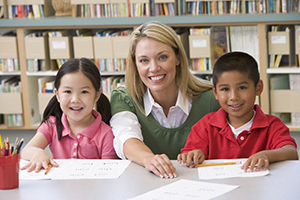
After the U.S. presidential election, many feel unsettled, scared, and divided. According to a survey sponsored by Teaching Tolerance, 90% of U.S. educators reported increased anxiety for minority students and an overall negative school climate. A report conducted by the Southern Poverty Law Center indicates that children of color are fearful and anxious as a result of the recent election.
But the United States isn’t the only place around the world where children, and even adults, feel vulnerable. Families and individuals fleeing war-torn countries like Syria and migrating to Europe often feel out of place and less than welcome.
Many of the vulnerable students here in the United States are fearful of being separated from their families. Students have cried and hugged their teachers, asking if they would be sent back to their home countries. Elsewhere, undocumented students or students with undocumented family members did not attend school the day after the election. Others expressed fear of being called a terrorist for wearing a Muslim hijab.
According to the survey conducted by the Southern Poverty Law Center, over 40% of teachers are hesitant to discuss the election with their students. However, we believe it is our responsibility to support children who are hurt, confused, or scared while helping other children who may not experience these feelings develop empathy for those who are. We urge educators to address students’ concerns while also teaching tolerance, acceptance, and a culture of respect that will transcend the four walls of the classroom.
As educators, we must reassure students that we will keep them safe. We can do this by creating and maintaining a respectful and kind classroom community as a microcosm of larger society. For example, as a fourth-grade teacher, Alyssa created a safe space for students to engage in difficult conversations and explore the common bonds of humanity leading up to the transition of power at The White House.
The election has capitalized on people’s differences, but instead of building people up as individuals, it has divided people and brought bitterness to the forefront. As teachers, we aim to instill students with the idea that they are unique and valued individuals, and highlighting differences in the classroom can develop self-confidence. The day after the election, students were asked to list 10 things that all people have in common—emphasizing similarities instead of differences. Initially, the students were quiet, but with some time, the pencils started moving, the confused looks turned into smiles, and hands went up, eager to share. Students noted everyone has a birthday, a family, goals, and dreams, everyone believes in something, and no one is perfect.
We discussed how elections require us to think about our beliefs and what principles guide our actions daily and make us individuals. This time, students were asked to write belief statements. They shared, “I believe…”:
- Everyone should be able to have a job.
- Everyone deserves to be loved.
- Everyone should be treated with kindness.
- You can do anything you set your mind to.
And when "I believe everyone should be respected for their differences," was shared, the classroom erupted with a resounding "Yes!"
We concluded with a conversation about the difference between agreeing with someone and respecting someone’s ideas. When we agree, we share a belief. When we respect someone, we acknowledge that someone is entitled to his or her own beliefs and we do not have to agree with someone’s belief. We explored ways that we could live out those beliefs every day and respect people's differences. I explained that there are a lot of serious and important topics attached to politics and new presidents. I explained that as 9-year-olds, they cannot vote and they cannot control some things but what we can control is the way that we live, the way we respond, and the way that we respect others’ differences.
This discussion about similarities and beliefs is just the start of building a foundation of compassion and critical thinking that shapes the future. These difficult conversations must occur regularly. As teachers, we have the power to provide our students with a safe space to talk about big issues to help cultivate kind, respectful, and caring young people. By telling the story about this particular class and the teacher's plans for continuing these conversations, we hope to inspire other educators to tackle difficult yet important topics with their own students. Our work as educators to foster solidarity is essential during this time of division and uncertainty.

 Katie Stover is an assistant professor of education and coordinator of Masters in Literacy at Furman University in South Carolina. Alyssa Cameron is a fourth-grade teacher at Roebuck Elementary in South Carolina.
Katie Stover is an assistant professor of education and coordinator of Masters in Literacy at Furman University in South Carolina. Alyssa Cameron is a fourth-grade teacher at Roebuck Elementary in South Carolina.